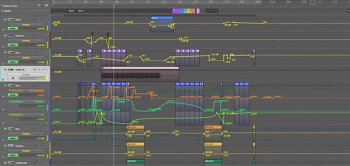If you were to have the chance to look at the mix session of a commercial song you'd be more surprised by the sheer exuberance of automation lines than by the number of plug-ins used. However, most budding engineers have the unfortunate tendency to neglect this stage of the mixing process. Which is a real pity because, apart from being a prerogative of professional mixes, in my opinion it's also one of the most fun aspects of the job! That's why I invite you to join me address the topic inn the following weeks.
Automation…?
Let’s start from the beginning explaining how automation works in general. Automation is a function that allows certain parameters to evolve in time…automatically. In the digital world, modern DAWs offer the possibility to automate almost any setting, from the volume faders to the pans and plug-in parameters. These automations are represented graphically by curves which can be written in real time when playing back a song or simply “drawn” directly with the mouse, depending on the DAW. We’ll discuss later on the pros and cons of each of these methods.
After reading this brief introduction, you might feel a bit dizzy thinking about all the possibilities this powerful function opens. And since it’s only too easy to do anything you want when sitting at the mixing desk, let’s see what good is automation for, from a pragmatic perspective.
What for?
In my world there are two types of automation for a mix to work: the first one I’ll call “functional” and the other one “artistic.”
The idea behind functional automation is pretty easy to understand. The goal is to fine-tune all the work you’ve done so far. Like improving how the different elements articulate together adjusting the parameters of this or that processing depending on how busy the arrangement is. This results in greater clarity and precision throughout the entire tune. Going back to the metaphor at the beginning of the series, think of it as fine-tuning the tri-dimensional aspect of your sonic puzzle through time, in order to get all the different pieces to blend in together better across the entire song.
“Artistic” automation on the other hand is used to enhance the climatic evolution of the song. You could say that it’s a way to manage how the mix works: what is at the forefront and what is part of the scenery and, especially, when – always according to your original vision of the mix, obviously. The idea is to always keep the listeners riveted by spotlighting certain elements at different times. This is the sort of automation that will make your song more lively, so that your audience doesn’t get bored.
See you next week to touch on in more detail some of the topics I mentioned here today!

